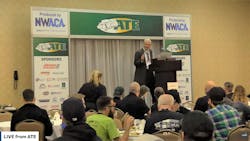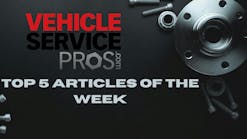Technicians must continue training or will quickly become irrelevant
The ever-increasing amount of information needed to diagnose and repair today’s complex vehicles can be a challenge. In fact, it’s “akin to sucking water out of a 3" fire hose,” said Gary Smith, owner of DiagNation, who pointed to the need for continued education, as well as collaboration, during his keynote speech, "Signals intelligence: a new breed of technician is born," at the Automotive Training Expo, produced by the Northwest Auto Care Alliance April 1-3 in Seattle.
“Even up to the 1980s, technology moved at a pace the average human could absorb, internalize, learn, and apply," Smith noted. "We are way beyond that with automotive technology today. We're moving in quantum leaps, and what that means is that every dedicated automotive professional in this room must study unceasingly and be willing to move with that technology. We have to pick up our pace and get more serious about learning the down and dirties about how the electronics work in these cars.”Drawing parallels to the military intelligence world, Smith likened technicians and service writers to various positions in that discipline.
“Those of you who have been fans of Soviet spy novels and movies about CIA, espionage, and so forth probably remember the guy sitting in the van with the headphones on listening to phone conversations and stealing computer messages," Smith said. "In the intelligence world, that person is a signal intelligence specialist. The acronym for that is SIGINT.
"Signals intelligence involves the whole entire team and involves the people who are gathering the intelligence disseminating the intelligence filtering that intelligence down the chain.”
Fundamentals need more emphasis
According to Smith, whose company delivers advanced diagnostic training, more understanding is needed by many of fundamental theory.
“We must be able to trace input and output signals correctly. We must be able to interpret our test results positively and correctly. We need to understand the electronics, the “tick-tock” of what’s going on inside that PCM, inside that airbag module, in order to get that diagnosis right. Automotive technicians need to come out of the linear DC world and start to study deeper into electronics and electrical theory to understand the new ADAS systems, the radio frequency-driven systems that these cars are now running on.”
Such skills will be needed more as new technologies such as 48V systems appear.
“That is our future for the next 20 years,” Smith said. “That’s our bridge technology: 48V systems between where we are now with hybrids and EVs, and the supposed demise of the ICE somewhere between 2035 and 2050. If we can bridge that gap by learning new electrical skills like inductance impedance, and how that figures into our circuit diagnosis, we're going to become very successful, and we're going to be remaining relevant in our industry.”
He added many in the industry don't take seriously the need for continuing education, and that those people "are quickly becoming irrelevant".
“We must live our testing. We must not throw modules and parts at the car until we get lucky, and it’s fixed. These components are way too expensive and way too difficult to unplug and plug into these cars and get programmed for us to be playing the guesswork game like we did in the 1980s. That’s a fact. I see it on the hotline every day.”
Human intelligence
Information-gathering by service writers and technicians is an essential skill for a successful outcome, Smith noted.
“A good intelligence specialist in the automotive industry gathers his or her information first before jumping into a diagnostic. As a hotline operator, I can tell you that is a huge weakness for the people in our industry, even the good guys. Why call the hotline? Because you need a ‘silver bullet.’ I get it; we’re all in the flat-rate world; we get paid on production.”
But for modern cars, there is no “silver bullet,” Smith said. “You must live your physical testing, or you’re just guessing.”
‘Find an Elmer’
In the 1920s, as the amateur (ham) radio developed, an early mentor in the field named Elmer was known for sharing his knowledge with fellow amateur radio enthusiasts. The nickname persists to this day for a mentor in the hobby. Similarly, Smith encouraged attendees to “find an Elmer.”
“I take being an Elmer for you guys pretty seriously, and I think every instructor in this room does," Smith said. We help coach and befriend and help to get better. Let’s walk together and get better together. We are skilled people.
"How many professionals in any industry do you know who can internalize mechanical, hydraulic, electrical, chemical, and combustion? How many people can do what we do? Not many. We need to hold that head high. We need to continue to go into work every day and solve those problems but do them better and quicker and get better at what we do. We are an elite group of specialized craftsmen whose job is to support citizens, industry, and business, and keep this great nation moving. That's who we are. Be proud of it every single day.”



